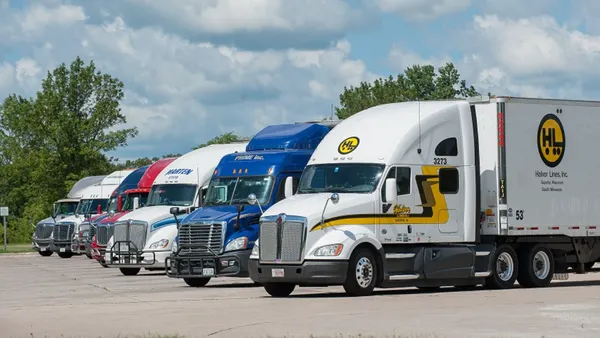Trucking leaders noted positive factors in the market during Q2 and July — while still warning that an inflection point is not yet here.
Companies such as P.A.M. Transportation Services, Schneider National and Werner Enterprises observed signs of seasonality and pointed to other encouraging factors during their Q2 earnings calls. Firms including Knight-Swift Transportation Holdings also highlighted changing patterns of carriers rejecting loads.
“That's one of the first indications that the supply chain does not have enough slack ... to absorb some incremental demand,” Knight-Swift CEO Adam Miller said, noting that rejections recently “hit a level we haven't seen probably since 2022 during the Fourth of July.”
Although rejection rates could be tighter, with current levels around 5%, they’re moved more toward market equilibrium, Werner CEO Derek Leathers said.
“While we are not calling a market inflection just yet and the sustainability of these trends has not yet proven, there are signs of market improvement,” Schneider National CEO and President Mark Rourke said.
Signs of tightening
Trucking companies noted clearer indications from carrier and customer habits, with events like International Roadcheck tightening supply.
Capacity tightening and signs of seasonal demand were more in tune with pre-COVID-19 pandemic periods, P.A.M. Transport CEO and President Joe Vitiritto added in an earnings statement.
Meanwhile, spot prices exceeded contract rates in June for the first time in two years, according to Rourke, who noted the trend and others have yet to take hold more clearly.
Nevertheless, contract pricing only gained modestly for Schneider, and pricing recovery has progressed more slowly than anticipated, Rourke said. “We are behind the tempo that we expected in our prior guidance,” he added.
Additionally, customers have expressed a need to secure more capacity, according to carriers such as Knight-Swift and Marten Transport.
Marten added 133 drivers to start off Q3 with multi-year dedicated offerings, while Knight-Swift said customers have felt routing guides start to fail, the companies said.
"We have a long way to go to return to our target levels of performance, but it is starting to feel like the bottom is behind us for this cycle,” Miller said in his earnings commentary.
Rate pressures, timing creating additional uncertainties
Executives were hesitant to say when an upcycle could occur, stressing that it was too early to diagnose.
"For the truckload segment, demand has yet to truly break out, and further attrition of excess capacity is still needed,” Miller also said.
With pricing still creating challenges, particularly in truckload, fleets sought to resist unsustainable rates.
For Knight-Swift, some shippers have sought nearly double-digit rate cuts, something the carrier can't provide, Miller said.
Werner further noted that pressure from earlier this year has made its way through the bidding process. “The reality is we are still inheriting rates that were negotiated through this early cycle bid season in Q1 that are now coming to implementation phases or already been implemented,” Leathers said, adding that recent bid activity has shown flat or even positive results.
For carriers such as Heartland Express, the freight market will improve with more capacity exits, and the company believes a positive turnaround will likely drag into 2025.
Looking at seasonal trends, Leathers said Werner’s earnings have gone up between Q2 and Q3 over about half the time over the last decade, while falling the other half.
“We are currently of the opinion you will see improvement Q2 to Q3, but it will be modest,” he said. “And the emphasis is on the word modest.”












